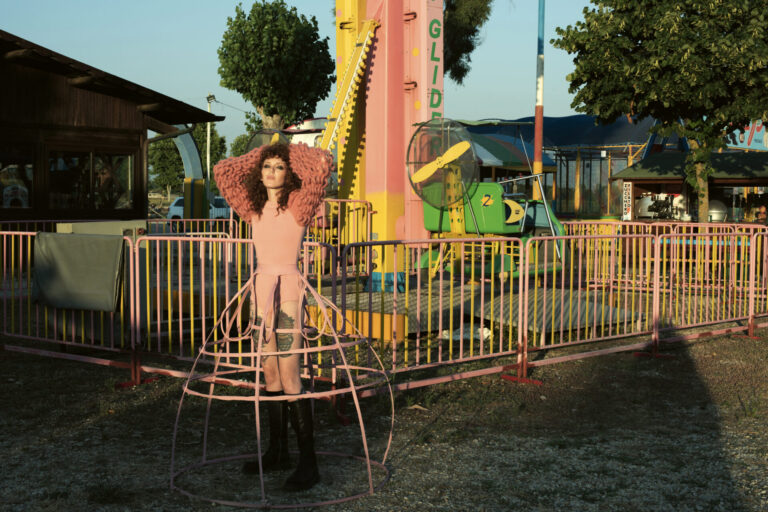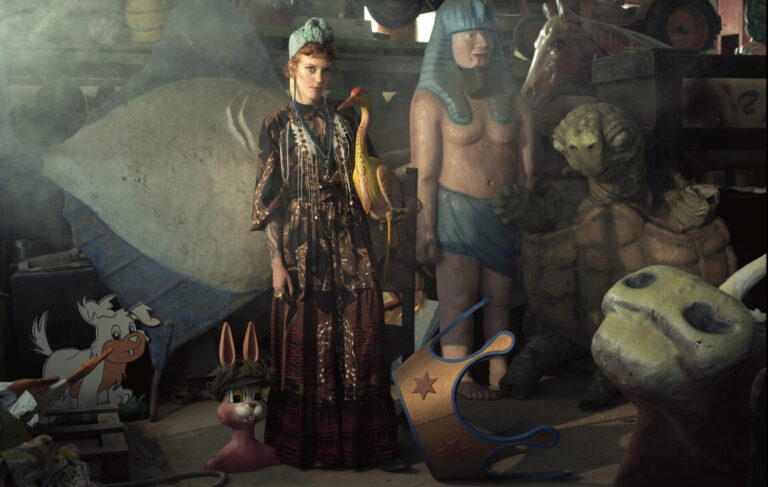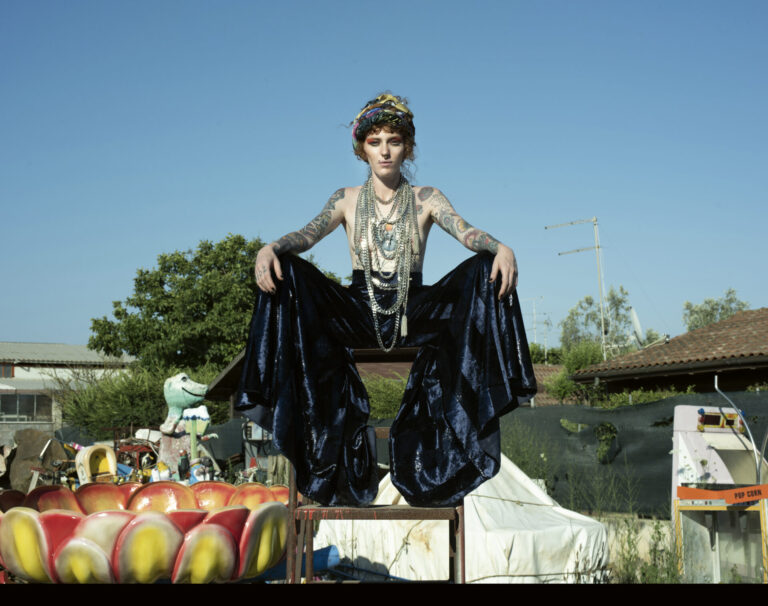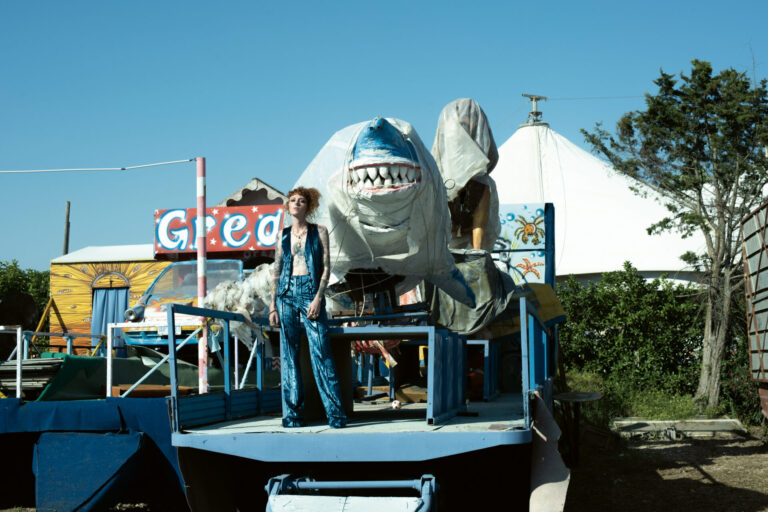FLEWID VOLUME 4
Styling Silvia Mongelli
Interview Stefano Ciavatta
“I hadn’t been on any actual tours and worked my way up, I did everything a little bit onthe spot. Things have always arrived without me looking for them. I grew up among musicians and actors in an underground dimension without ever having certain opportunities, children of a world where ambition is linked to working on fairground rides and not in music itself. A world of self-taught musicians who remain just that. Very few have emerged and I am one of the exceptions.” She’s also a tattoo artist by profession. The first tattoo you see on her arm is “about the disease I had”, a woman’s face that cuts death’s head off with a scythe, the second is “a little gypsy woman I’d be with the “calci in culo” from the fairground tattooed on her chest. But I still have to do the tattoo of the symbol of the Sinti, the wheel, I’d really like to do it, I’m thinking about it.”
At what age did you start tattooing?
“I’ve been tattooing since the age of 21, I got
passionate about it at art high school. At first, I drew
them myself, then for friends at home in Thiene. Then I
did the training course in Milan while I was working in a
bar. Then I worked in shops: first in Malo, in Vicenza then at the
“Sacrum Cor” in Zanè, and in Trastevere at “The Bad
Church Tattoo”.
When did music arrive?
Music has always been part of my family. All self-taught,
no one has ever studied. My father plays the guitar
and sings. He recorded a single in 1981. He even
won the “Corrida” television show at the age of sixteen .
My uncle sings an Italian melodic repertoire. My grandmother on my
father’s side used to go to taverns to sing as a girl. My
maternal one was a pianist like her mother. They had
taken piano lessons but none of them had been to the
conservatory. This self-taught thing stuck with me, I also
studied by myself.
Where did you grow up?
In Thiene, and then as nomadic, living in a caravan, as we
went around all the town fairs and festivals with our
shooting gallery sideshow in the middle of a world
of swing carousels and tagadas.
My family is special: my father is Sinti, my mother is not, far from it;
the daughter of entrepreneurs, she ranaway from home at the age of 25 and her family didn’tt ake it well. The first cases of mixed marriages date back to the 1950s. My father was one of the first to
get married like this in Italy. Theirs is an impossible and
perfect love story, super romantic.
Until when did you travel round with your parents?
My father had already realized that the world of rides
was in decline when I was a child. Luckily my mother
had kept her job as a clothes designing consultant.
They decided to settle in Thiene to send me to school,
which, in our world, isn’t a priority because you are your
own entrepreneur and from an early age you think
more about getting a driving license for trucks than
about a school diploma. I finished elementary and
middle school, then the art high school in Schio.
They only put on the fair in the summer. My father has always
had problems since he stopped with the rides: you
come for generations of entrepreneurs then you stop,
you are no longer a traveller, you find yourself doing
something else, all possible jobs, but nobody trusts
you enough to hire you because “you’re a gypsy”.
They still live in Thiene. He suffers from insomnia except
in the summer when he can sleep in his caravan.
Have you ever thought about writing a song
about your origins?
Yes, but I haven’t done it yet. I never hid my origins, it’s a part of me
that is very present. As a child at school and then as
a teenager, I did have some problems, a boy didn’t
want to go out with me anymore after finding out that
I belonged to the Sinti. I had a tough life, I know what
poverty is, literally not having money to eat. I’ve always
felt a little different.
I grew up with all my Sinti relatives –
sometimes I get confused with all the different relatives
– but the world of the fairground workers is my family: it is
the life I come from,and i’m proud of it.
On the street you have to learn to survive, you do anything, you are a factotum, you help and learn from everyone, it’s another way of growing..
Also, we knew so many people, and we all grew up
together, there is a different family value.
You are not the first star in your family.
I’m the great-granddaughter of Osiride, the family
idol: he was a stuntman, acrobat, fire-eater, wrestler,
he worked in the film Ben Hur and in those swordand-
sandal movies where papier-mâché statues fall
on men. He made over 120, he also worked with
Fellini, Germi, Lattuada. He lived for years in Rome in
the Garbatella district in front of the Catacombs of
Commodilla in his two caravans, he fought to have
a house in Ostia and succeeded. Luckily, I met him
before he passed away. The owner of the depot for
the scenery for the rides of the Togni family of Sinti
origins, where we went to take the pictures for this
article, knew Osiride well and for that reason he had
given us permission to enter. It was exciting to enter this
warehouse of colours, lights, creatures and characters.
But the family stories are not over: Renato Mastini, my
grandmother’s first husband was a partisan, he was
one of the ten martyrs of Vicenza, four of whom were
Sinti. Pregnant and very young, she managed to save
herself, and returned to her family and many tears later she remarried.
Today, a real Sinti no longer exists, over the years
everything has mixed, it is a radically changed world,
society has changed us, the decline of the traveling show is accelerating everything, this life is being abandoned.
It is a shame as it is a tradition that is part of Italy.
And now music?
Now, for me, professional music is a new world. It’s really
tough! I produce myself; I already have two tracks out
plus Al confine tra me e me with Ghemon and a fourth
on Youtube written by me, I don’t have an album yet but I hope to
release one in 2021, and that’s why I’m concentrating
on two singles. I always think that for me it can’t go
wrong because I am who I am, I do what I like and I have already
achieved many things. Officially I am a performer and
that is how I went to Sanremo, but I went on X Factor
with my own song because I want to be a songwriter.
My secret dream is to create my own audience, perform
in my concerts, make a living with music and tattoo for
pleasure. Wherever that takes me, always a nomad.












